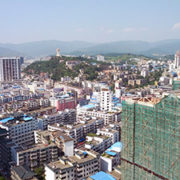Tag Archives | urbanization
Making Cities More Livable, Urban development
 Urban development
Urban development
 Industry and trade, Urban development
Industry and trade, Urban development
 Finance sector development, Urban development
Finance sector development, Urban development
 Economics, Education, Environment, Health, Population, Social development and protection, Urban development
Economics, Education, Environment, Health, Population, Social development and protection, Urban development
 Industry and trade
Industry and trade
 Social development and protection, Water
Social development and protection, Water

Rethinking High-Rise Living: Balancing Urban Growth and Sustainability in Asia’s Cities

Vertical cities have emerged as a potential solution to the challenges of urbanization in Asia.
World competition among cities: City trends and the framing of a livable city

Over the next 3 decades, about 70% of the world’s population is expected to be living in urban areas. Within the next decade, by 2030, the world is projected to have over 40 megacities with more than 10 million inhabitants. Such population flows into cities will disrupt the functioning of cities and lead to urban issues, such as transportation congestion, air pollution, and housing shortages.
High-speed rail investment: A butterfly effect for urban chaos

In 1969, Professor Edward Norton Lorenz coined the term “butterfly effect” to state that subtle changes in conditions can influence or cause seemingly unrelated results elsewhere. The flutter of a butterfly’s wings at place A can eventually develop into a hurricane at place B even though A and B are not related. Almost two decades after the term was coined, Japan National Railways (JNR) was privatized and split into several corporations, and now JR East manages the largest network of railway lines in Japan.
New challenges, opportunities, and strategic choices for financing sustainable urbanization in the PRC

In recent years, the People’s Republic of China (PRC) has accelerated its urbanization process and increased its urbanization rate from 35.88% in 2000 to 56.7% in 2016, equating to over 1% year-on-year growth. The PRC proposed the “people-oriented” New-type Urbanization Plan in 2014 to definitively release further domestic demand potential, promote social equity and welfare improvements, and facilitate economic, social, and ecological integrated development.
Pointers from Asia for urbanization in Africa

Africa and Asia are latecomers to urbanization. In these two continents, less than half live in urban centers, while elsewhere, more than 70% of people do. But Africa and Asia are now rapidly urbanizing, with Asian cities growing at an average of 1.5% per year and Africa’s at 1.1% per year.
Exploring the trade–urbanization nexus in developing economies: evidence and implications

Modern humans have been increasingly concentrated in cities. The United Nations forecasts that 60% of the world’s population will live in urban areas by 2030. Regional multilateral institutions such as the Development Bank of Latin America and the Asian Development Bank have stepped up their efforts to support the urban sector and to collaborate on comparative studies of urbanization.
Extending the reach of flood insurance

Over the past few weeks, South Asian countries have been suffering torrential rains and devastating floods and landslides, exacerbated by Cyclone Komen, leaving over 100 dead and over a million displaced from Pakistan to Myanmar. The annual monsoon season in the region, normally a lifeline for farmers, this year resulted in floods that have caused severe damage to crops.


Search
Subscribe / Connect to Asia Pathways
Subjects
- Accelerating Progress in Gender Equality
- Addressing Remaining Poverty and Reducing Inequality
- Agriculture and natural resources
- Capacity development
- Climate change
- Economics
- Education
- Energy
- Environment
- Finance and Innovation
- Finance sector development
- Gender
- Globalization and Economic Stability
- Governance and public sector management
- Health
- Industry and trade
- Information and Communications Technology
- Infrastructure
- Making Cities More Livable
- Miscellaneous
- Population
- Poverty
- Private sector development
- Regional cooperation and integration
- Sanitation
- Social development and protection
- Strengthening Governance and Institutional Capacity
- Subjects
- Transport
- Uncategorized
- Urban development
- Video Blog
- Water
Recent Posts
- From Crisis to Resilience: The Evolution of the Banking Sector in Asia and the Pacific
- Tariffs on the Table: What Could Be Asia’s Next Move?
- Investing in Childcare a Win for Women and the Economy
- Flush and Flourish: Upgraded Toilets Can Transform Lives in Rural Asia
- New Ways for Climate Finance and Development in Asia and the Pacific




Recent Comments